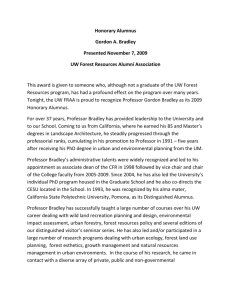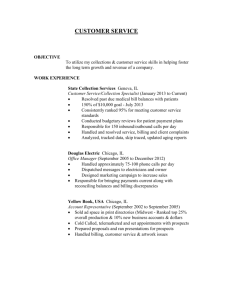Strategy Syllabus
advertisement
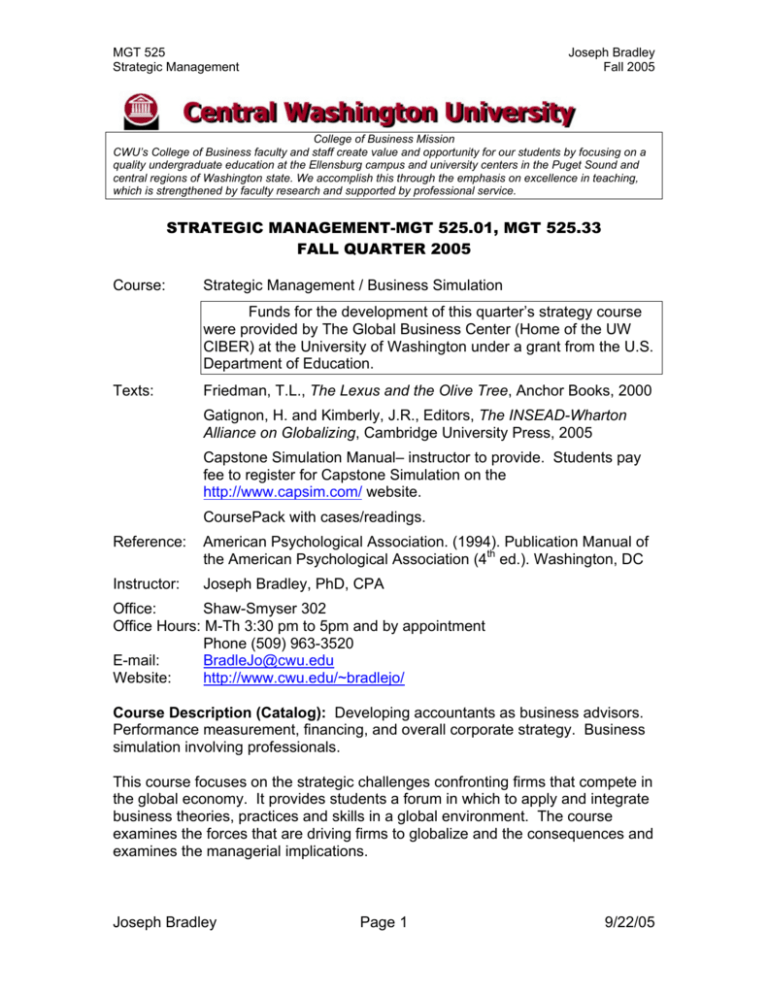
MGT 525 Strategic Management Joseph Bradley Fall 2005 College of Business Mission CWU’s College of Business faculty and staff create value and opportunity for our students by focusing on a quality undergraduate education at the Ellensburg campus and university centers in the Puget Sound and central regions of Washington state. We accomplish this through the emphasis on excellence in teaching, which is strengthened by faculty research and supported by professional service. STRATEGIC MANAGEMENT-MGT 525.01, MGT 525.33 FALL QUARTER 2005 Course: Strategic Management / Business Simulation Funds for the development of this quarter’s strategy course were provided by The Global Business Center (Home of the UW CIBER) at the University of Washington under a grant from the U.S. Department of Education. Texts: Friedman, T.L., The Lexus and the Olive Tree, Anchor Books, 2000 Gatignon, H. and Kimberly, J.R., Editors, The INSEAD-Wharton Alliance on Globalizing, Cambridge University Press, 2005 Capstone Simulation Manual– instructor to provide. Students pay fee to register for Capstone Simulation on the http://www.capsim.com/ website. CoursePack with cases/readings. Reference: American Psychological Association. (1994). Publication Manual of the American Psychological Association (4th ed.). Washington, DC Instructor: Joseph Bradley, PhD, CPA Office: Shaw-Smyser 302 Office Hours: M-Th 3:30 pm to 5pm and by appointment Phone (509) 963-3520 E-mail: BradleJo@cwu.edu Website: http://www.cwu.edu/~bradlejo/ Course Description (Catalog): Developing accountants as business advisors. Performance measurement, financing, and overall corporate strategy. Business simulation involving professionals. This course focuses on the strategic challenges confronting firms that compete in the global economy. It provides students a forum in which to apply and integrate business theories, practices and skills in a global environment. The course examines the forces that are driving firms to globalize and the consequences and examines the managerial implications. Joseph Bradley Page 1 9/22/05 MGT 525 Strategic Management Joseph Bradley Fall 2005 An understanding of management, marketing, financial and economic principles and concepts is assumed. Teaching methods employed may include lecture, case methodology, strategy simulation game, class presentations, and films – balancing theory with management practice. The instructor reserves the option to adjust the class schedule as needed due to student progress, guest lectures, etc. Course Objectives: A fundamental question of strategy is what determines the international success and failure of companies. This course will study the links between the organization, its strategy and its environment. This relationship is characterized by complexity, uncertainty, and change. Course Outcomes: Strategy: ¾ Demonstrate understanding of the strategy concept. ¾ Understand the role of the general manager in the strategy process. ¾ Understand models of how organizations formulate strategy. ¾ Apply the formal way of doing strategy analysis. ¾ Understand global strategy formulation. Organization: ¾ Learn the forms of organizational structure ¾ Understand the role of culture and power in strategy ¾ Learn how the various managerial styles impact strategy and operations. Context ¾ Learn the process by which strategy is formulated and formed in particular situations. Active involvement ¾ Active listening. ¾ Thoughtful communications. ¾ Added-value contributions to class discussions. Teamwork ¾ Work in collaboration with others ¾ Learn from each other. ¾ Appreciate and leverage differences Course Format: The student is expected to sharpen conceptual and communication skills through case analysis, project presentations and written term papers. The student will also be required to use a computerized management simulation software package, library resources, Internet and other electronic media in order to conduct necessary work for the course. The course will be conducted as a seminar. The instructor will act as a moderator, questioner, and lecturer to help you gain a better understanding of Joseph Bradley Page 2 9/22/05 MGT 525 Strategic Management Joseph Bradley Fall 2005 the strategic decision making process. The student is expected to read and analyze and present the assigned material for each class and to develop personal positions on key ideas found in the readings. Students will present portions of the materials each session. Students not presenting are expected to be prepared with comments and contribute their reasoned perspectives on the topics. Student teams are to meet, largely outside of class hours, to analyze and resolve the simulation project. Team presentations to the class are required. Evaluation of Course Performance: 1. Strategy, Organization and Context a. Case discussion: For each section of the text we will analyze cases based on real business situations. These cases will enable you to apply the concepts and analytical tools described in the text. In order to benefit from these case discussions each student should: i. Come to class well prepared. Read the case several times and think about how the concepts from the text or class discussions can be applied. Make notes that you can refer to during the class discussion. ii. Contribute ideas and analysis to the class discussion. Given the complexities of the real world, there is no single right answer. Using the strategic concepts and tools to analyze the situation is the important thing. iii. Listen carefully to the class discussion and suggest supporting or alternative views. iv. Participation is graded on quality and not just quantity. b. Individual Research Paper: An individual research paper will be required. The paper should be a maximum of six pages, not including bibliography and exhibits. The student will present a summary of the paper to the class. Pick a topic related to the course. Some possible topics may be: corporate governance, strategic alliances, leadership, trust, knowledge management, decision-making, entrepreneurship, etc. Submit a half page proposal including your topic and the sources you plan to use by the Mid term exam date (10/20/05). The requirements of this paper are to read three articles on the chosen topic from one of the top business journals. Describe the major concepts of each article, how the articles relate to each other and develop and support your own position on the topic. Articles can be chosen from Harvard Business Review, Sloan Management Review, California Management Journal. Academy of Management Journal, Academy of Management Executive, Academy of Management Review, and Strategic Management Journal. If you Joseph Bradley Page 3 9/22/05 MGT 525 Strategic Management Joseph Bradley Fall 2005 want to use articles from a source other than these journals, check with the instructor first. The paper will be due November 10, 2005. c. Business Article Application Memo/Presentation: To encourage you to read the popular business press and apply the concepts of the course, you will be responsible for writing two article application memos and presenting your articles to the class. In each of these memos you will apply a concept or framework from one of the chapters to information contained in the business press article about a specific company. Publications such as The Economist, Fortune, Forbes, Fast Company, Business Week, New York Times, etc. are excellent sources. If you use an article found on the Internet, print it out before you begin work on the assignment. Each memo must not exceed one page in length. The first memo/presentation is due no later than October 18, 2005. The second memo/presentation is due no later that November 15 2005. Choose an article about a company other than one that you analyzed for either cases or the individual research assignment. In you memo, identify one or two concepts or frameworks introduced in the text that are illustrated in the article. Explain what the concepts mean and how they are illustrated in your article. What analysis or observations can you offer that improve or expand what is said in the article. Attach a copy of the article with your write-up. d. Midterm Exam: The midterm exam will be due on October 20, 2005. The exam will be either a series of essay questions based on the text material and/or a series of questions on a case. e. Final Exam: The final exam format will be announced prior to the due date, December 6, 2005. The exam will be either a series of essay questions based on the text material and/or a series of questions on a case. 2. Active Involvement Class participation is a primary element of active involvement. You should: • Use the concepts of strategy and apply them to current situations you have read about or seen in the media. • Relate class material to your own personal experience. • Bring your own unique perspective to class discussion. • Develop oral communication skills, learning to present ideas concisely and persuasively and respond effectively to the comments of others. Joseph Bradley Page 4 9/22/05 MGT 525 Strategic Management • Joseph Bradley Fall 2005 Use class discussion as a practice for job interviews, where you will be expected to respond to business problems similar to those in class. Joseph Bradley Page 5 9/22/05 MGT 525 Strategic Management Joseph Bradley Fall 2005 Class Attendance and Participation: Because of the importance of the collective learning experience, regular attendance is required. It is important that you arrive on time so that the class may start promptly. Arriving late is very disruptive and discourteous to the class. If you have more that two unexcused absences during the quarter, you class participation grade will suffer. If you miss a class it is your responsibility to find out from your classmates what was covered in class and to pick up any handouts from me. Absences are considered excused for religious holidays and documented illness or family emergencies. Evaluation of class participation will be based upon the student’s ability to raise and answer question, to bring up ideas or insights and to build upon the ideas of others, not simply the frequency of speaking-quality not quantity. If you do not speak up, I have no way of evaluating if you came to class prepared. 3. Team work Team work is your opportunity to build and test your skill at working in collaboration with others, obtaining better results by sharing team members’ knowledge and experience, and building enjoyable working relationships despite differences in opinions and priorities. a. Business Strategy Game: This simulation provides students with the opportunity to gain a nearly “real world” experience in developing strategies, making business decisions, and forecasting and reporting financial and organizational performance. The simulation provides a rich competitive environment and sufficient information so that student team can adequately analyze organizational and market performance and plan accordingly. The instruction manual is excellent and each student should have a copy and should read the manual thoroughly. Students successful at playing the game have usually read the manual thoroughly. GRADE CALCULATION The following are the grading criteria by which students will be evaluated along with the weights assigned to each item. Component Case Discussion Individual Research Paper/Presentation Business Article Application Memo/Presentation Midterm Exam Final Exam Attendance/Participation Joseph Bradley Page 6 Percent 10% 15% 10% 15% 20% 10% Points 100 150 100 150 200 100 9/22/05 MGT 525 Strategic Management Joseph Bradley Fall 2005 Business Simulation Game Total 20% 100% 200 1000 Written Assignments: Written assignments are to be typed, double-spaced and follow correct form, spelling, grammar, etc. Work turned in late is subject to a grading penalty. All written material submitted is to conform to the documentation and punctuation criteria set forth in the Publication Manual of the American Psychological Association. CLASS SCHEDULE Week DATE 1 Thurs., 9/22/05 2 Tues., 9/27/05 Globalization INSEAD Wharton, Chapter 1, Globalization and It’s Challenges, Gatigon and Kimberly, pp 1-22 The Lexus and the Olive Tree, Chapters 1-4 Thurs., 9/29/05 Governance INSEAD Wharton: Chapter 2, The Changing International corporate governance landscape, Guillen and O’Sullivan, pp 23-48. Chapter 3, Corporate governance and leadership in a globalizing capital market, M. Useem, pp 49-77. Leadership The Lexus and the Olive Tree, Chapters 5-7 INSEAD Wharton, Chapter 4, Leadership in global organization: a cross-cultural perspective, Javidan, Stahl and House Education INSEAD Wharton: Chapter 5, Globalization of business education, De Meyer, Harker, and Hawawin, pp 104-128 Continue Introduction to Capstone Game Capstone Practice Round due Tues Noon 3 Tues., 10/4/05 Thurs., 10/6/05 Joseph Bradley TOPIC Introduction: Review syllabus, discuss course requirements, goals, and format Why is the study of strategy relevant to the MPA program? What is the role in strategy formation and implementation for a professional accountant? Overview of Strategy Page 7 9/22/05 MGT 525 Strategic Management 4 Tues., 10/11/05 Thurs., 10/13/05 5 Tues., 10/18/05 Thurs., 10/20/05 6 Tues., 10/25/05 Joseph Bradley Fall 2005 The Lexus and the Olive Tree, Chapters 8-11 Acquisitions; INSEAD Wharton: Chapter 6, Globalization thr9ought acquisitions and alliances: an evolutionary perspective, Singh and Zollo, pp. 129158 Case: A Latin American Factory Start-Up: Intel in Costa Rica Case: Coca-Cola’s Marketing Challenges in Brazil: The Tubainas War Capstone Practice Round due Today Noon INSEAD Wharton: Chapter 7, Developing new products and services fro the global market, Angelmar, pp. 159-183 Chapter 8, Managing brands in global markets, Day and Reibsteini, pp. 184-206 Hand out Mid term exam The Lexus and the Olive Tree, Chapters 12-14 INSEAD Wharton: Chapter 9: Global marketing of new products, Gatignon and Van den Bulte, pp. 207-228 Capstone Round 1 input due Tuesday 12 noon Last day to present Business Application Memo 1 Mid Term Exam Due INSEAD Wharton: Chapter 10, Global equity capital markets for emerging growth firms: patterns, drivers, and implications for the globalizating entrepreneur, Amit and Zott, pp 229-254 Chapter 11, Cross-border valuation: the international cost of equity capital, Bodnar, Dumas and Marston, pp. 255-287 The Lexus and the Olive Tree, Chapters 15-18 INSEAD Wharton: Chapter 12, Managing risk in global supply chains, Kleindorfer and Van Wassenhove, pp 288- 305 Capstone Round 2 input due at 12 noon. Thurs., 10/27/05 7 Tues., 11/1/05 INSEAD Wharton: Chapter 13, Global recombination: cross-border technology and innovation management, Anderson and Rosenkopf, pp 306-330 The Lexus and the Olive Tree, Chapters 19-20 INSEAD Wharton: Chapter 14, From corporate social responsibility to global citizenship, Orts, pp. 331-353 Capstone Round 3 input due at 12 noon Thurs., 11/3/05 Joseph Bradley INSEAD Wharton: Chapter 15, Colliding forces: domestic politics and the global economy, De Meyer, pp 378-394 Page 8 9/22/05 MGT 525 Strategic Management 8 9 10 11 Finals Week Tues., 11/8/05 Thurs., 11/10/05 Tues., 11/15/05 Thurs., 11/17/05 Tues., 11/22/05 Thurs., 11/24/05 Tues., 11/29/05 Thurs., 12/1/02 12/6/05 Joseph Bradley Fall 2005 INSEAD Wharton: Capstone Round 4 input due at 12 noon INSEAD Wharton: Chapter 17, Globalization and it’s many faces: the case of the health sector, Burns, D’Aunno and Kimberly, pp 395421. Cases: Case: 15 NBC Research paper presentations. Capstone Round 5 input due at 12 noon Last day to present Business Application Memo 2 Research paper presentations. Research paper presentations Capstone Round 6 input due - Noon Thanksgiving Holiday-No Class Research paper presentations INSEAD Wharton: Chapter 18, Conclusion: The continuing process of globalizing, Gatignon and Kimberly, pp 442-430 Final Exam Due – 6PM The Instructor reserves the right to modify course schedule and/or procedures in the event of circumstances beyond his control. Joseph Bradley Page 9 9/22/05 MGT 505 Customer Value / Leadership Joseph Bradley Winter 2006 College of Business Mission CWU’s College of Business faculty and staff create value and opportunity for our students by focusing on a quality undergraduate education at the Ellensburg campus and university centers in the Puget Sound and central regions of Washington state. We accomplish this through the emphasis on excellence in teaching, which is strengthened by faculty research and supported by professional service. CUSTOMER VALUE / LEADERSHIP-MGT 505.01/.33 WINTER QUARTER 2006 Course: CUSTOMER VALUE / LEADERSHIP Funds for the development of this quarter’s Customer Value/Leadership course were provided by The Global Business Center (Home of the UW CIBER) at the University of Washington under a grant from the U.S. Department of Education. Texts: James L. Heskett, W. Earl Sasser, Jr., and Leonard A. Schlesinger. (2003). The Value Profit Chain. New York: The Free Press Jack Welch & John A. Byrne (2003), Jack: Straight from the Gut, Warner Books, 2003 Jean Lipman-Blumen. (1999) Connective Leadership. Oxford, UK. Oxford University Press. Reference: Instructor: Case: Edward Jones, Harvard Business Cases Shouldice Hospital, Harvard Business Cases NYPD New, Harvard Business Cases Leading Across Cultures: Current Issues in the United Kingdom Leading Across Cultures: Germany American Psychological Association. (1994). Publication Manual of the American Psychological Association (4th ed.). Washington, DC Joseph Bradley, EMBA, CPA Office: SS-302 Office Hours: T-Th 1 pm to 2 pm, M-W 3pm to 4pm, and by appointment Telephone: (509) 963-3520 E-mail: BradleJo@cwu.edu Website: http://www.cwu.edu/~bradlejo Course Description (Catalog): Developing accountants as business advisors. Assessment and delivery of customer value, quality, and human resource management. Customer value survey of accounting firm client. An understanding of management, marketing, financial and economic principles and concepts is assumed. Joseph Bradley Page 1 1/4/2005 MGT 505 Customer Value / Leadership Joseph Bradley Winter 2006 Teaching methods employed may include lecture, case methodology, class presentations, and films – balancing theory with management practice. The instructor reserves the option to adjust the class schedule as needed due to student progress, guest lectures, etc. Joseph Bradley Page 2 1/4/2005 MGT 505 Customer Value / Leadership Joseph Bradley Winter 2006 Course Objectives: A fundamental question about service industries is why do some firms provide outstanding customer satisfaction over long periods of time. Upon completion of this course you should be able to do the following. 1. Identify and describe what customers regard as value, how a firm attains total customer satisfaction, the role of employee satisfaction in creating value, the role of quality in creating value. Apply this conceptual understanding to various new situations in case analysis 2. Create as reporting system that measures both historical and forwardlooking information to help management create and implement desired service levels. 3. Demonstrate knowledge of the role of leaders in the high performance organization. 4. Enhance student communication skills through oral presentations and writing assignments. Course Outcomes: Upon completion of the class you should be able to: Objectives Assessment The Value Profit Chain ¾ Apply the Value Profit Chain Assignment #1 – Apply the Value model to various business Profit Chain to Edward Jones enterprises ¾ Measure customer satisfaction, employ satisfaction and effective management Jack, Straight from the Gut ¾ Demonstrate an understanding • Assignment #2 – Case Assignment of Leadership principles practiced at GE ¾ Apply the GE/Strategy/Leadership to a case situation Connective Leadership (Lipman Blumen) ¾ Demonstrate an understanding Assignment #3 – Compare and of the various concepts of contrast the various styles of leadership and their relationship leadership to organizational performance Critical Thinking Assignments 1-3 and Class Participation Added-value contributions to class discussions Thoughtful presentation of assigned reading material to class Joseph Bradley Page 3 1/4/2005 MGT 505 Customer Value / Leadership Joseph Bradley Winter 2006 Course Format: The student is expected to sharpen conceptual and communication skills through case analysis, project presentations and written term papers. The student will also be required to use library resources, Internet and other electronic media in order to conduct necessary work for the course. The course will be conducted as a seminar. The instructor will act as a moderator, questioner, and lecturer to help you gain a better understanding of the customer value and leadership. The student is expected to read and analyze the assigned material for each class and to develop personal positions on key ideas found in the readings. The instructor presents portions of the materials each session and calls on students to comment and contribute their reasoned perspectives. Students will also be asked to present portions of the material for each session. Evaluation of Course Performance: 1. Individual Presentations A significant part of the class will involve student presentations of the required reading material to the rest of the class. Such presentation should summarize the major concepts of the reading and relate them to other reading in the class, reading and theories from prior classes and examples for cases and outside readings for this and other classes. The presenters should try to engage the rest of the class with questions and opportunities to comment. 2. Individual Assignments Three individual assignments will be due as indicated on the class schedule a. Assignment #1. The requirement is to apply the concepts of the Service Profit Chain to the Edward Jones case and to develop some measurement of customer satisfaction. More specific instructions will be provided prior to the assignment. b. Assignment #2. The requirement is to develop a Balanced Scorecard for Edward Jones to provide the information called for by the Balanced Scorecard and The Service Profit Chain. More specific instructions will be provided prior to the assignment. c. Assignment #3. Describe the various theories of leadership. . More specific instructions will be provided prior to the assignment. 3. Class Attendance and Participation: a. Attendance. Because of the importance of the collective learning experience, regular attendance is required. It is important that you arrive on time so that the class may start promptly. Arriving late is Joseph Bradley Page 4 1/4/2005 MGT 505 Customer Value / Leadership Joseph Bradley Winter 2006 very disruptive and discourteous to the class. If you have more that two unexcused absences during the quarter, your class participation grade will suffer. If you miss a class, it is your responsibility to find out from your classmates what was covered in class and to pick up any handouts from me. Absences are considered excused for religious holidays and documented illness or family emergencies. b. Participation. Evaluation of class participation will be based upon the student’s ability to raise and answer question, to bring up ideas or insights and to build upon the ideas of others, not simply the frequency of speaking-quality not quantity. If you do not speak up, I have no way of evaluating if you came to class prepared. • • • • • • Use the concepts of the readings and apply them to current situations you have read about or seen in the media. Relate class material to your own personal experience. Bring your own unique perspective to class discussion. Develop oral communication skills, learning to present ideas concisely and persuasively and respond effectively to the comments of others. Use class discussion as a practice for job interviews, where you will be expected to respond to business problems similar to those in class. Participation is graded on quality and not just quantity. GRADE CALCULATION The following are the grading criteria by which students will be evaluated along with the weights assigned to each item. Component Individual Presentations Assignment #1 Assignment #2 Assignment #3 Attendance/Participation Total Percent Points 20% 200 20% 200 20% 200 30% 300 10% 100 100% 1000 Written Assignments: Written assignments are to be typed, double-spaced and follow correct form, spelling, grammar, etc. Work turned in late is subject to a grading penalty. All written material submitted is to conform to the documentation and punctuation criteria set forth in the Publication Manual of the American Psychological Association. Joseph Bradley Page 5 1/4/2005 MGT 505 Customer Value / Leadership Joseph Bradley Winter 2006 Academic Integrity Policy: Ideas and learning form the core of the academic community. In all centers of education, learning is valued and honored. No learning community can thrive if its members counterfeit their achievement and seek to establish an unfair advantage over their fellow students. The academic standards in this class are based on a pursuit of knowledge and assume a high level of integrity in every one of its members. When this trust is violated, the academic community suffers injury and must act to ensure that its standards remain meaningful. The vehicle for this action is the Student Judicial Code outlined in the CWU Catalog, Appendix B, Section Two. All assignments submitted in fulfillment of course requirements must be the student’s own work. All assignments except those designated as “team” are meant to be individual efforts. Joseph Bradley Page 6 1/4/2005 MGT 505 Customer Value / Leadership Joseph Bradley Winter 2006 CLASS SCHEDULE Week DATE 1 Wed., 1/5/06 2 Mon., 1/10/06 3 4 Wed., 1/12/06 Mon., 1/17/06 Wed., 1/19/06 Mon., 1/24/06 Wed., 1/26/06 5 6 Mon., 1/31/06 Wed., 2/2/06 Mon., 2/7/06 Wed., 2/9/06 7 Mon., 2/14/06 Joseph Bradley TOPIC NO CLASS TODAY Introduction: Review syllabus, discuss course requirements, goals, and format. Overview of Class. Why is the study of customer value and leadership relevant to the MPA program? Role of professional accountant as business advisor. The Value Profit Chain Read Part I (Ch 1-2) – Achieving Value-Centered Change The Value Profit Chain Read Part II (Ch 3-5) – Getting Management’s Attention NO CLASS TODAY – MARTIN LUTHER KING DAY The Value Profit Chain Read Part II (Ch 6-8) – Engineering Value Profit Change The Value Profit Chain Read Part II (Ch 9-10) – Engineering Value Profit Change Reading: Customer Value Driven Strategy Reading: Delivering Excellent Customer Service: Lessons from the Best Firms The Value Profit Chain Read Part III (Ch 11-14) – Cementing The Gains Cases: Shouldice Hospital NYPD (new) Strategy Maps Part I: Overview: Ch 1-2 Strategy Maps Part II: Value-Creating Processes (Ch 3-5) Strategy Maps Part IV: Building Strategies and Strategy Maps Read HCS Case (instructor to hand out) and complete assignments Assignment #1 Due – Edward Jones Strategy Maps Part II: Value-Creating Processes (Ch 6) Part III: Intangible Assets (Ch 7-8) Strategy Maps Part III: Intangible Assets (Ch 9-10) Part IV: Building Strategies and Strategy Maps Page 7 1/4/2005 MGT 505 Customer Value / Leadership 8 9 Wed., 2/16/06 Mon., 2/21/06 Wed., 2/23/06 Mon., 2/28/06 Wed., 3/2/06 10 Mon., 3/7/06 Wed., 3/9/06 Final Joseph Bradley Winter 2006 HSX Case Be prepared to build strategy map on any other organization NO CLASS TODAY – PRESIDENTS’ DAY Leadership Readings: Bass, Concepts of Leadership Pfeffer, The Ambiguity of Leadership Goleman, What Makes a Leader? Others to be assigned Connective Leadership Read Part One (Ch. 1-4) The Changing Dynamics of Leadership Assignment #2 Due Connective Leadership Read Part Two (Ch. 5-8) – The Connective Leadership Model Connective Leadership Read Part Two (Ch. 9) – The Connective Leadership Model Read Part III (Ch. 10-12) – Bridging to the Stage 3 World Leadership Readings (to be assigned.) Kerr: On the folly of rewarding A, while hoping for B. Pearce: The future of leadership: Combining vertical and shared leadership to transform knowledge work Wrap-up and summary Finals (Assignment #3) due March 14, 2006 The Instructor reserves the right to modify course schedule and/or procedures in the event of circumstances beyond his control. Joseph Bradley Page 8 1/4/2005
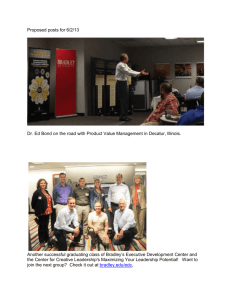

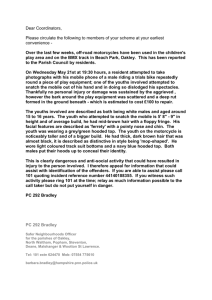
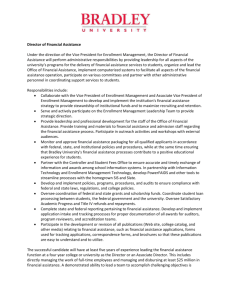
![Title of the Presentation Line 1 [36pt Calibri bold blue] Title of the](http://s2.studylib.net/store/data/005409852_1-2c69abc1cad256ea71f53622460b4508-300x300.png)
![[Enter name and address of recipient]](http://s3.studylib.net/store/data/006894526_1-40cade4c2feeab730a294e789abd2107-300x300.png)
